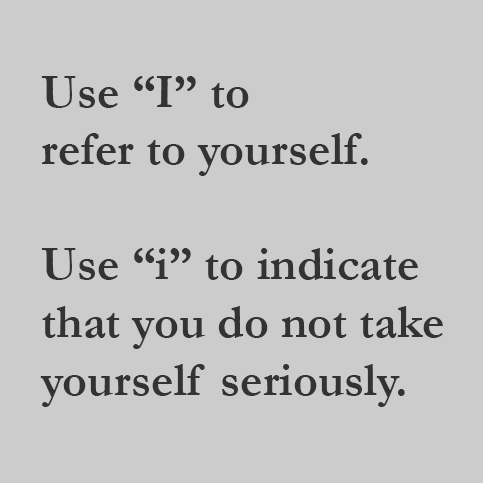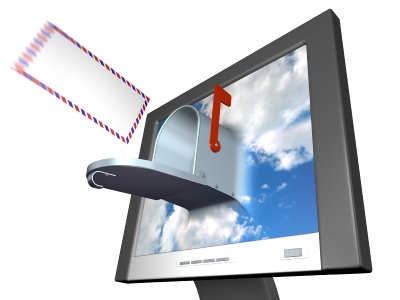Neuroscience
Every professor, instructor, teaching assistant and administrator will tell you that they receive a lot of emails from students... and every one of them will agree that many of those emails do more to hurt the author than to help him or her. In an age where communication is generally informal and abbreviated (u no, like in a txt 2 a frend), the importance of being able to write clear, professional letters (whether in print or by email) has been lost. The biggest problem with this, beyond what in the short term might come across accidentally as sloppiness and disrespect, is that in the long term these habits will cost you interviews, jobs and professional opportunities.
 College is the perfect time to develop your professional skills and practice them as a matter of habit so that you never make the mistake of sending the wrong impression to the person at the other end.
College is the perfect time to develop your professional skills and practice them as a matter of habit so that you never make the mistake of sending the wrong impression to the person at the other end.
If you get the link to this article as part of a reply, don't take it personally... take it as friendly advice that will serve you very well in your future. It may seem trivial, or ego-oriented, but professionalism counts in the real world and you're already in it. How you address and write an email establishes from the very beignning that you take yourself seriously enough to be professional in your communication... and that's the best way to get someone else to take you seriously. Create the impression that you don't consider yourself a professional adult and that's exactly what others will think too.
BEFORE YOU WRITE: Know your audience and what they expect. If it's your friend, it's fine to be informal. But if you are writing someone in a professional role then you can expect he or she expects you to be equally professional. If you are writing to ask a question, ask yourself one first... is the answer to this in the syllabus, or in any other resources that I have? If the answer is yes, or even maybe, look there first before you write the email. It's always acceptable to ask a clarification question, just make sure you've put in the time to do the background research first and know as much as you can from what you have available. Asking "When is worksheet 2 due?" when that is posted in the syllabus communicates that you didn't take the time to look for yourself.
FROM: Believe it or not, your professor does not know who JazzyHands046 is, and probably isn't too thrilled about getting an email from HotBunny86. The first, most important thing you can do for yourself is make sure that you have an email address that represents you as a young professional. You can always keep a separate one for your friends, but the account that you send emails to instructors, teaching assistants, administrators and employers should be based on your name. Be sure that whatever email client you use has your full name in the settings so that the recipient sees that in the FROM line, and not just the email address alone.
TO: Be sure you have the correct email address. That may seem obvious, but there's no better way to not get a reply to your email than to have a typo in your TO field. It happens more than you think.
SUBJECT: Always put a clear subject line that indicates what the purpose of the email is. If it is in reference to a course, put the course number first and then the heading. Keep it short and to the point, and avoid things like "EXTREMELY URGENT" unless it really is a matter of life or death.
In the body of your email there are some essential elements that every piece of professional correspondence contains:
GREETING: Take a minute to do your homework on this one and make sure that you are appropriately addressing the person that you're writing to. Unless you've specifically been directed to use a first name, ALWAYS error on the side of being more formal and addressing the person with a title and last name.
- You Are In Charge Of Your Email!
Do you check your email first thing in the morning? Be honest! I confess to checking my email at least 2d or 3d thing, both at work and at home. academic coach provides 5 tips on how to be more productive by spending less (but more concentrated) time...
- Data Curator, Anyone?
Great article about the National Archives and Records Administration (NARA) in the June 2005 issue of Technology Review. David Talbot talks about what NARA's mission is (to save every document the government produces) and how that mission is complicated...
- Last Psychology Professor Lunch: Dr. Nazish Salahuddin On 5/6/15! Limited Spots Available So Act Now!
Student-Faculty Lunchtime Conversations Wednesday, May 6th - Dr. Nazish Salahuddin (Counseling) http://ter.ps/nazlunch Psi Chi and the Department of Psychology are hosting a series of noontime lunches giving undergraduates an opportunity to talk...
- Need Some Internship Or Job Search Guidance? Check Out The University Career Center's 2014-2015 Terp Guide!
2014-2015 Terp Guide University Career Center & The President's Promise http://careers.umd.edu/UMD_TG_14-15/UMD_TG.html The University Career Center just launched the 2014-2015 Terp Guide. It is overflowing with great advice for students...
- Paid Psyc 100 Teaching Assistant Position - Fall 2013
The Department of Psychology has a paid position to support one of its Introduction to Psychology (PSYC 100-FC01) courses for the fall semester. Responsibilities include: Leading pre-structured activities during discussion sections meetingsOnline grading...
Neuroscience
What You Write Matters: Advice on Email Etiquette for Everyone
 |
| Emails are letters without envelopes |
 College is the perfect time to develop your professional skills and practice them as a matter of habit so that you never make the mistake of sending the wrong impression to the person at the other end.
College is the perfect time to develop your professional skills and practice them as a matter of habit so that you never make the mistake of sending the wrong impression to the person at the other end.If you get the link to this article as part of a reply, don't take it personally... take it as friendly advice that will serve you very well in your future. It may seem trivial, or ego-oriented, but professionalism counts in the real world and you're already in it. How you address and write an email establishes from the very beignning that you take yourself seriously enough to be professional in your communication... and that's the best way to get someone else to take you seriously. Create the impression that you don't consider yourself a professional adult and that's exactly what others will think too.
BEFORE YOU WRITE: Know your audience and what they expect. If it's your friend, it's fine to be informal. But if you are writing someone in a professional role then you can expect he or she expects you to be equally professional. If you are writing to ask a question, ask yourself one first... is the answer to this in the syllabus, or in any other resources that I have? If the answer is yes, or even maybe, look there first before you write the email. It's always acceptable to ask a clarification question, just make sure you've put in the time to do the background research first and know as much as you can from what you have available. Asking "When is worksheet 2 due?" when that is posted in the syllabus communicates that you didn't take the time to look for yourself.
FROM: Believe it or not, your professor does not know who JazzyHands046 is, and probably isn't too thrilled about getting an email from HotBunny86. The first, most important thing you can do for yourself is make sure that you have an email address that represents you as a young professional. You can always keep a separate one for your friends, but the account that you send emails to instructors, teaching assistants, administrators and employers should be based on your name. Be sure that whatever email client you use has your full name in the settings so that the recipient sees that in the FROM line, and not just the email address alone.
TO: Be sure you have the correct email address. That may seem obvious, but there's no better way to not get a reply to your email than to have a typo in your TO field. It happens more than you think.
SUBJECT: Always put a clear subject line that indicates what the purpose of the email is. If it is in reference to a course, put the course number first and then the heading. Keep it short and to the point, and avoid things like "EXTREMELY URGENT" unless it really is a matter of life or death.
In the body of your email there are some essential elements that every piece of professional correspondence contains:
 |
| Make your greeting professional |
- If you know that the recipient has a doctorate (e.g., Ph.D., M.D.) then you should address them as "Dr. Smith."
- If you're writing a course instructor and you're not sure, you can always go with the more generic "Professor Smith."
- If you are writing anyone else, and you are certain that they have not earned a doctorate, you should address him as Mr. Smith and her as Ms. Smith.
BODY: Here are a few general guidelines to follow:
- Open with something pleasant, at least in the first email that you send. You don't have to lay it on thick, but a friendly greeting establishes pleasant tone and that's how you would greet someone in person. If you're replying to a reply you can skip past the pleasantries and get to the point.
- Write like a professional adult. That means using appropriate language, complete words, grammatically correct sentences. Proof read and spell check carefully... sloppy mistakes do not represent you well. If this is a particularly important email, have at least two other people read it carefully over for you before you click send.
- Be clear, concise and organized. One massive, jumbled paragraph makes it very difficult to read and reply to you. If you're writing about something in detail, make sure that your email is broken up into sensible paragraphs and that you keep it as short as possible while still communicating all of the important information. If you're asking a clarification question, make your question specific and clear... don't just write "I don't understand question number 2," explain what you understand and what you're unclear on.
- If you are upset, save the draft and send it later. Remember that emails are FOREVER and you can't take them back. Sometimes what felt good to send at the moment doesn't feel like the best idea later on. Rather than shooting off an angry email, make sure that you are engaging in a polite and professional conversation. As the old saying goes, you can catch more flies with honey than with vinegar.
CLOSING: It is always a nice way to end your email by thanking the other person for their time and attention... a simple recognition that by writing you are asking for a bit of someone's time, and that you appreciate their time is limited, communicates the respect you would hope to be treated with. Sign your email with a polite closing (e.g., Best, Sincerely, Thank You,) and your full name (you can always sign your first name and then use a signature line that has your full name, title and contact information). Again, the recipient might not see or recognize your name in your email address, so sign your full name. If you are emailing an instructor, academic advisor or administrator it also may be very helpful to include your Student ID number so that they can pull up your records easily (a lot of students have the same or similar names).
INSPIRATIONAL QUOTES: Some people have inspirational or funny quotes as a signature line on the bottom of all their emails. Our advice... don't. As good as your intentions may be, that saying, joke, bible verse or movie quote isn't something you would put at the bottom of a formal cover letter to an employer, so don't put it at the end of your professional emails.
In short, make sure that every email you send presents you as the professional young adult you would like to be treated as. Taking the time to do it right may very well make the difference between getting the reply/offer/assistance/exception you are hoping for and, well, getting something else instead.
- You Are In Charge Of Your Email!
Do you check your email first thing in the morning? Be honest! I confess to checking my email at least 2d or 3d thing, both at work and at home. academic coach provides 5 tips on how to be more productive by spending less (but more concentrated) time...
- Data Curator, Anyone?
Great article about the National Archives and Records Administration (NARA) in the June 2005 issue of Technology Review. David Talbot talks about what NARA's mission is (to save every document the government produces) and how that mission is complicated...
- Last Psychology Professor Lunch: Dr. Nazish Salahuddin On 5/6/15! Limited Spots Available So Act Now!
Student-Faculty Lunchtime Conversations Wednesday, May 6th - Dr. Nazish Salahuddin (Counseling) http://ter.ps/nazlunch Psi Chi and the Department of Psychology are hosting a series of noontime lunches giving undergraduates an opportunity to talk...
- Need Some Internship Or Job Search Guidance? Check Out The University Career Center's 2014-2015 Terp Guide!
2014-2015 Terp Guide University Career Center & The President's Promise http://careers.umd.edu/UMD_TG_14-15/UMD_TG.html The University Career Center just launched the 2014-2015 Terp Guide. It is overflowing with great advice for students...
- Paid Psyc 100 Teaching Assistant Position - Fall 2013
The Department of Psychology has a paid position to support one of its Introduction to Psychology (PSYC 100-FC01) courses for the fall semester. Responsibilities include: Leading pre-structured activities during discussion sections meetingsOnline grading...
